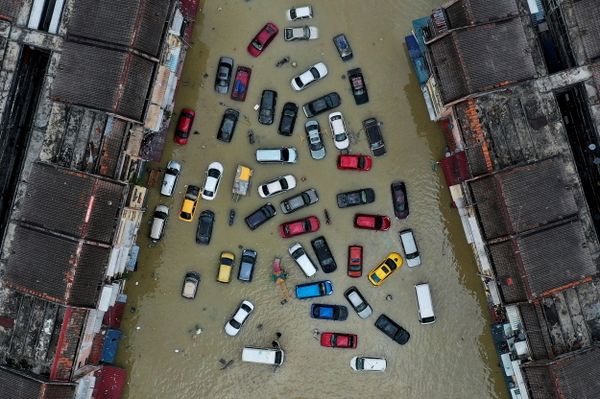By Rafiqah Rauf
SHAH ALAM, June 19 — Public education and awareness regarding climate change must be strengthened, particularly to encourage communities to become the eyes and ears of the authorities in monitoring incidents related to extreme weather.
Selangor Climate Adaptation Centre (SCAC) executive director Daniel Lee said that community involvement, especially in high-risk areas like highlands, is crucial in identifying early warning signs such as cracks and erosion.
“If we rely solely on our team to conduct inspections, we might assume it is old erosion, not something that has just occurred. But if residents are already alert, they can report it immediately, allowing us to take earlier action,” he said.
[caption id="attachment_404558" align="alignright" width="389"] Selangor Climate Adaptation Centre (SCAC) executive director Daniel Lee during SCAC's launch at the Concorde Hotel in Shah Alam on May 19, 2025. — Picture by REMY ARIFIN/MEDIA SELANGOR[/caption]
Selangor Climate Adaptation Centre (SCAC) executive director Daniel Lee during SCAC's launch at the Concorde Hotel in Shah Alam on May 19, 2025. — Picture by REMY ARIFIN/MEDIA SELANGOR[/caption]
Lee was speaking as a guest panellist on the Bicara Semasa programme recently, commenting on the state government’s approach to strengthening adaptation and mitigation efforts against climate change.
He emphasised that this effort is vital not only for public wellbeing, but also to ensure Malaysia's economic competitiveness remains strong, especially in the aftermath of the major floods in 2021.
“According to data from the Department of Statistics Malaysia (DOSM), the losses from that incident amounted to RM6.1 billion nationwide, with RM3.1 billion occurring in Selangor alone.
“Of that amount, RM1 billion involved damage to homes, RM800 million to vehicles, and over RM1 billion more affecting the business and manufacturing sectors.”
“This not only disrupted people’s lives but also impacted the state’s economy, which contributes 26 per cent to the national gross domestic product,” Lee said.
On December 17, 2021, extraordinary rainfall exceeding 300 millimetres caused unprecedented flooding in Selangor, affecting over 31,000 victims.
[caption id="attachment_307374" align="aligncenter" width="1056"] Image for illustration purposes only. — Picture by PEXELS[/caption]
Image for illustration purposes only. — Picture by PEXELS[/caption]
Selangor is committed to sustainable development
The SCAC's establishment demonstrates the state government’s commitment to taking a proactive approach in addressing climate-related disasters.
He added that several plans are currently being formulated to ensure that the sustainability agenda can be realised as effectively as possible.
“The state government is committed to sustainable development that can be balanced with environmental preservation.
“It has also shown strong commitment through the Climate Change Policy, the establishment of SCAC, and policies such as the Logging Moratorium, which will run until 2035 and may potentially be extended,” Lee said.
Other efforts include focusing on the green economy sector and collaborating with local authorities to develop climate change action plans.
“Development of renewable energy (RE) projects, energy efficiency projects for buildings — we also aim to explore the circular economy, and various recycling initiatives are being intensified.
“We are also planning a series of workshops to build capacity and provide training for the local authorities to identify risks and develop appropriate action plans to address those risks,” he said.
On May 19, SCAC was launched to serve as a research and policy coordination centre based on data and science, aiming to devise more proactive actions in addressing the climate crisis.
State executive councillor for public health and the environment Jamaliah Jamaluddin said that the SCAC will coordinate research, foster collaboration between academic institutions and government agencies, and align efforts with international standards, positioning Selangor as a leading example of climate governance in Malaysia.
Tackling climate change starts at home
Lee noted that climate change cannot be addressed solely at the government or agency level, but must also begin at home and in the community through lifestyle changes, including energy conservation and the use of public transportation.
“The three major contributors to carbon emissions are electricity, transport fuel, and waste. The public can reduce this impact through practices like prudent energy use, recycling, and composting.
"These are simple actions but can have a huge impact if done collectively,” he said.
According to Tenaga Nasional Berhad (TNB), the demand for electricity supply in Selangor continues to increase in line with economic development and population density, with the latest peak demand reaching 4,720 megawatts.
[caption id="attachment_281121" align="aligncenter" width="1409"] A view of the flash flood at Taman Sri Muda in Section 25, Shah Alam, on December 20, 2021. — Picture by FADZA ISHAK[/caption]
A view of the flash flood at Taman Sri Muda in Section 25, Shah Alam, on December 20, 2021. — Picture by FADZA ISHAK[/caption]




